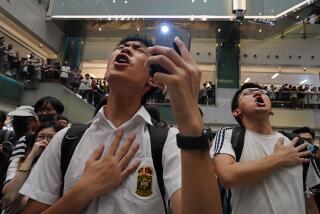‘Nonsense’ Music New Fad in Hong Kong
HONG KONG — Hong Kong’s angry teen-agers have a snappy answer to Chinese leaders who say nobody was killed in Beijing’s Tian An Men Square in June--nonsense.
“Nonsense” is the latest musical fad in Hong Kong, a bizarre repetition of meaningless phrases that reflect the frustration and hopelessness of many young people after the brutal crackdown on student-led protests in Beijing.
Called mo lay tau in Hong Kong’s Cantonese dialect--”no past, no future” is a rough translation--the rhythmic talk that sounds something like American rap music has turned into a protest chant.
The trend was started by the Sorcerers, two entertainers who started hosting a weekly radio show called “Whizkids” a year ago, doing nothing but murmuring words such as “really, not really” and “you spoke!”
“Really, not really” was spoken over and over again by hundreds of teen-agers at a memorial rally 100 days after troops stormed Tian An Men Square, killing hundreds if not thousands of democracy supporters of democracy.
It was the teen-agers’ reaction to the Chinese leadership’s official line that those killed in the square were attacking troops.
Although mo lay tau started before June, artists and sociologists say the events in China have made teen-agers use it and develop it as a means of venting frustration.
“These funny phrases are very popular in my school,” said May Chan, a 16-year-old girl who was waiting outside the radio station for her idols to appear.
Besides their radio program, the Sorcerers have also published nine books during the last few months, consisting only of scripts of their shows.
Lam Man Chung and Tseng Chi Wai, a lyrics writer and a movie star, respectively, are another duo who have hit the big time with nonsense.
They issued a record and tape called “Wire & Wireless Station” at the end of July. That was nothing but meaningless songs and dialogues. In the first two days it sold 25,000 copies.
Lam said their only purpose in making the recording was to create happiness.
“Hong Kong people are very sad after the June 4th incident and I want to cheer them up.”
Eric Kwot, one of the Sorcerers, agreed that the military intervention in Beijing was a key factor in the development of mo lay tau .
“We speak nonsense because there is not much we can do or think about, especially after June 4th,” he said. “I can’t imagine what will happen here after 1997 (when control of Hong Kong passes to China). My thought is like terminated by a rest note,” he added, slipping easily into nonsense talk.
Carol Li, a Sorcerers fan, said: “I used to know nothing about the Chinese Communist party but after June 4th, I am frightened. . . . My parents have told me to play and eat while I still have a chance.”
Her view gains sympathy with Ng Chun Hung, a sociology lecturer at the University of Hong Kong. “That’s no surprise. Sometimes I feel the same way,” he said.
Ng said Hong Kong people, particularly youngsters, are only now realizing that they had no say in Hong Kong’s future as a result of the Sino-British agreement of 1984 under which the British colony reverts to Beijing’s sovereignty in 1997.
“The situation worsened after the June 4th incident. Most young people turned to fast, immediate stimuli which gradually formed a trend,” said the sociologist.
“They are turning to a kind of informed escapism. They choose to do nothing after considering all factors.”
More to Read
Sign up for Essential California
The most important California stories and recommendations in your inbox every morning.
You may occasionally receive promotional content from the Los Angeles Times.








